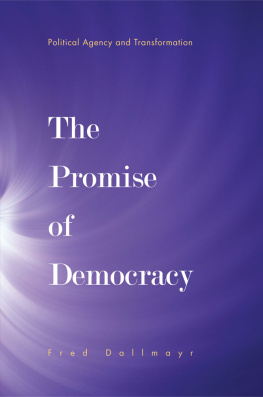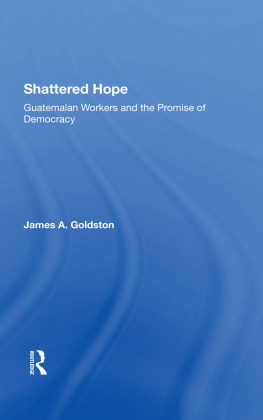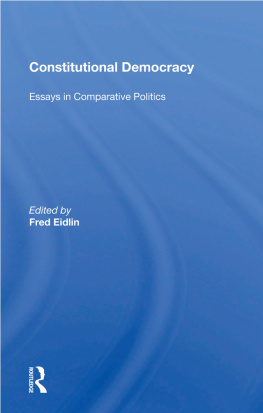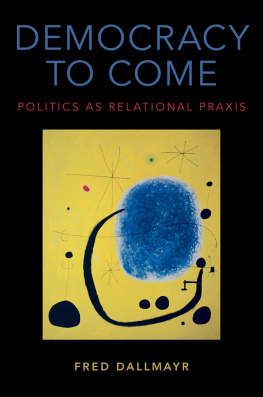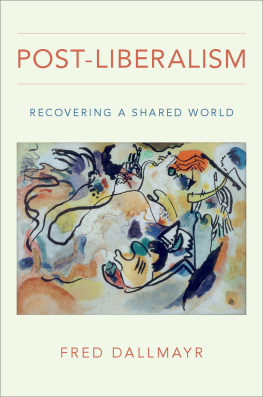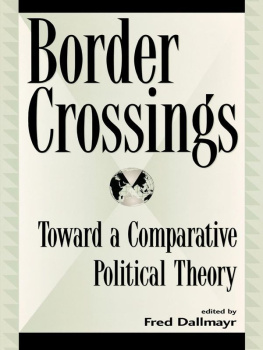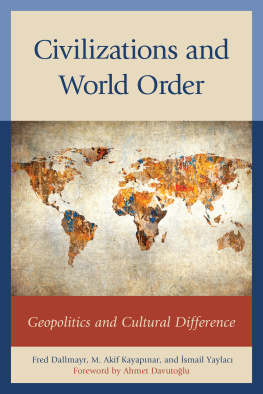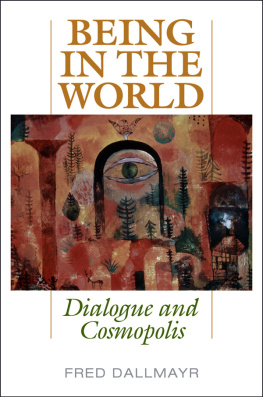Published by State University of New York Press, Albany
2010 State University of New York
All rights reserved
Printed in the United States of America
No part of this book may be used or reproduced in any manner whatsoever without written permission. No part of this book may be stored in a retrieval system or transmitted in any form or by any means including electronic, electrostatic, magnetic tape, mechanical, photocopying, recording, or otherwise without the prior permission in writing of the publisher.
For information, contact State University of New York Press, Albany, NY www.sunypress.edu
Production by Kelli W. LeRoux
Marketing by Michael Campochiaro
Library of Congress Cataloging-in-Publication Data
Dallmayr, Fred R. (Fred Reinhard), 1928
The promise of democracy: political agency and transformation / Fred Dallmayr.
p. cm.
Includes bibliographical references and index.
ISBN 978-1-4384-3039-3 (hardcover: alk. paper)
1. Democracy. 2. DemocracyPhilosophy. I. Title.
JC423.D278 2010
321.8dc22 2009021089
10 9 8 7 6 5 4 3 2 1
Everything depends on establishing this [civic] love in a republic.
Montesquieu
Democracy is more than a form of government; it is primarily a mode of associated living, of conjoint communicated experience.
John Dewey
To understand and judge a society, one has to penetrate its basic structure to the human bond upon which it is built.
Maurice Merleau-Ponty
Democracy needs to be reconceived as something other than a form of government: as a mode of being that is constituted by bitter experience but is a recurrent possibility as long as the meaning of the political survives.
Sheldon Wolin
Preface
The modern age is often described as an era of science and industryand also of democracy. Since the time of the European Enlightenment, societies have been rocked by powerful upheavals, and most prominently by democratic or semi-democratic revolutions. The French thinker Alexis de Tocqueville saw these upheavals as momentous signposts and democracy as a near-providential destiny. Ideologies and ideological movements have sprung up in support of this destiny. During the twentieth century, great wars have been fought to make the world safe for democracy; and the end is not in sight. In tandem with this massive upsurge, however, grave doubts have arisen regarding its trajectory. In the view of some, the historical trajectory has come to a halt; for others; democracy finds itself now in deep crisis.
A leading American political philosopher has written a book recently raising the question Is democracy possible here? (and providing only a very ambivalent answer). In turn, political theorist Jean Bethke Elshtain has published a stirring text titled Democracy on Trial. Focusing mainly on American democracy, Elshtain pinpoints as a central concern the danger of losing democratic civil society under the onslaught of rampant fragmentation and self-aggrandizement. Although a properly construed democratic agency, she writes, is not boundless subjectivist or self-seeking individualism, the worry is that it has, over time, become so. Once this happens, the blessings of democratic life that Tocqueville so brilliantly displayedespecially the spirit of equalitygive way and in their place other more fearful and self-enclosed, more suspicious and cynical habits and dispositions rise to the fore.
Worries of this kind are not fanciful, but are grounded in reallife experience as well as in broader historical considerations. What is at stake is not so much or not only (as is often claimed) the relation between individual liberty and security, but that between liberalism and democracy itself. Apart from its other epithets, modernity is also called the time of the unfolding of human freedom; and as a modern regime, democracy cannot possibly deny the claims of freedom. But here history enters the scene. Modern liberalism arose in the eighteenth century, well before the rise of democracy; hence, there is a sibling rivalry with the elder frequently trying to trump or erase the other. As it happens, early liberalism typically located individual liberty in a presocial and prepolitical state of nature, a stratagem that inevitably places political democracy in a subordinate or derivative position. This claim of a presocial or prepolitical status is the source of the rampant individualism about which Elshtain complains. In our time, under the aegis of neo-liberalism and laissez-faire market ideologies, this hankering for a presocial (Hobbesian) state of nature has reached its zenith, with the result of undercutting democracy as a shared political regime. Although hard to believe in a presumably civil or civilized period, we now have bands of mercenaries and well-paid hired guns providing for public security and peace without any public accountability. As someone has observed (and only half in jest): democracy is being outsourced, or has already been outsourced, to private contractors.
Tired of cumbersome bureaucracies, some well-meaning individualistsincluding some postmodern intellectualsmay find appealing the thought of exiting society and return to nature. On closer inspection, however, they may want to revise their inclination. Returning to nature here does not mean escaping to an idyllic island. In the vocabulary of Thomas Hobbesto which modern Western thought remains deeply indebtedthe so-called state of nature is also a state of incessant warfare, of relentless killing or being killed. In the opinion of the political philosopher mentioned above, we are getting close or have already reached that condition. American politics, he writes, is in an appalling state. We are no longer partners in self-government; our politics are rather a form of war. Well-meaning people, especially devoted democrats, should ponder this fact. For, in unregulated warfareand departing somewhat from the Hobbesian scenariokilling does not happen in an egalitarian fashion. Typically, killing is being done by the side with superior weapons, superior manpower, and superior financial resources. Thus, in a modern state of nature, warfare (civil or uncivil) tends to pit the powerful against the powerless, the rich against the poor, the ruthless against the cautious. What is equally distributed in this conditionwhich Hobbes correctly described as nasty, solitary, and brutishis only the pervasive sense of fear or what today we prefer to all terror. Those enamored with the downsizing of politics and the project of privatizing everything in sight should note well the end point of their project: the unleashed condition of mayhem and fear, with everyone trying to terrorize everyone else.
Have things gone too far already? Maybe so. But this only means that particularly dedicated efforts have to be made to change course and to champion resolutely a return to the political: in the sense of a return to a well-ordered regime or polis committed to justice and ethical well-being. In our time, this has to be a return to democracyor rather the anticipation of a possible, although not presently actual, democratic regime. As another political theorist has recently remarked: We could take the perfect storm threatening democracy as an occasionan instigationto reinvent boat(s) more worthy of journeys to the democratic promise. It is in this spirit that this volume takes the present dismal condition as an instigation to pursue another possibility or potentiality: the largely untapped promise of democracy or what Jacques Derrida has called democracy to come. To be able to move in this direction, however, a radical change or transformation (perhaps a


